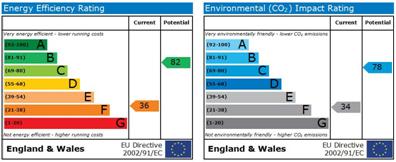




























Energy Performance CertificatesThe objective of obtaining an Energy Performance Certificate (EPC) is to comply with the new EPBD directives implemented in the UK over the past 2 years. The certificate presents several key bits of information. Ratings are represented with a chart with grades from ‘A’ to ‘G’ , where ‘A’ is the most energy efficient and ‘G’ is the least. EPC’s can only be obtained by an accredited energy assessor. Our company takes care of employing the right person for the report who will suggest improvements in order to make the building more efficient. These suggestions are an indication only and do not have to be implemented. The idea is to provide prospective tenants or purchasers with up to date information on a building’s efficiency presented in a cost graph and also a CO2 emission chart to highlight environmental impact.
When are Energy Performance Certificates required?An Energy Performance Certificate is only required when a building is constructed, sold or rented out. It is the responsibility of the person selling or renting a building to have a valid EPC to show to prospective buyers and tenants. The EPC must be given to the eventual buyer or tenant. Since 1 October 2008 all commercial buildings will require an EPC on sale, rental or upon construction. The certificate is valid for ten years, or until a newer EPC is prepared. For a building to fall within the requirement for an EPC it must: · have a roof and walls and use energy to condition the indoor climate (i.e has heating, air conditioning or mechanical ventilation) then you will require an EPC. A building can either be the whole building or part of a building designed or altered to be used separately. The sale and let of commercial buildings can be complex with floors let to different tenants, and with a mixture of retail, office and residential accommodation. The EPC required for any space you offer for sale or let must reflect the accommodation on offer. Selling or letting a building as a whole You can prepare an EPC for the whole building, even if that building has parts designed or altered to be used separately with separate heating systems. Selling of letting part of building, where the building has a common heating system If a building has a common heating system, then the seller or prospective landlord can prepare (or make available) an EPC for the whole building or for a part designed or altered to be used separately. The EPC will be based on the energy consumption of the building apportioned in relation to the area of the accommodation being offered. Buildings with separate parts and separate heating systems An EPC should be prepared (or made available) for each part of a building that is being offered separately for sale or let. The EPC should reflect the services in those part(s) being offered for sale or let and will include a portion of the energy consumption of any common areas that exist solely or mainly for access to the part. Residential accommodation Any separate residential accommodation that is self-contained will require its own EPC (using SAP or RdSAP as appropriate). Residential space that can only be accessed via commercial premises (i.e. a house with a shop in a downstairs room or a shop with accommodation where the access is through the shop) will be assessed with the commercial premises as a single building (where SBEM is more appropriate). Modifications to a building If a building is modified to have more or less parts that are designed or altered to be used separately and the modification includes the provision or extension of heating, hot water, air conditioning or mechanical ventilation then an EPC for the building must be provided on completion of the work. Further guidance on whether buildings require an EPC can be found in Improving the energy efficiency of our buildings: A guide to energy performance certificates for the construction, sale and let of non-dwellings. Buildings which don't need an EPC EPCs are not required before the construction of a building is completed. Nor are they required on the sale, rent or construction of: · places of worship · temporary buildings with a planned time of use less than two years · stand alone buildings with a total useful floor area of less than 50m2 that are not dwellings · industrial sites, workshops and non-residential agricultural buildings with low energy demand As the purpose of EPCs is to enable potential buyers or tenants to consider energy performance of a building as part of their investment, transactions which do not involve a new owner or tenant may not require an EPC. Examples might include: · lease renewals or extensions to existing tenants · compulsory purchase orders · lease surrenders |

